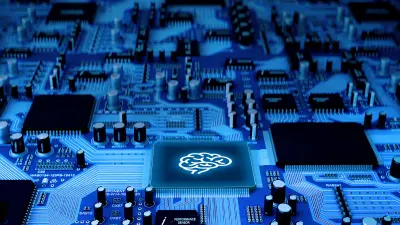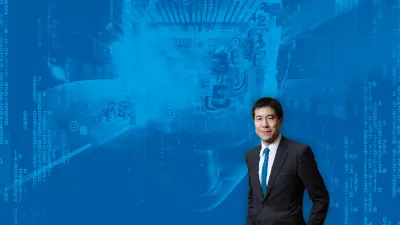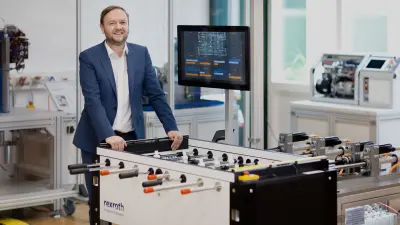The key questions about artificial intelligence

2018-08-30
Artificial intelligence (AI) is an important part of the digital revolution. It will considerably alter our lives and the way we work in the future. But what exactly does it mean? Your questions — our answers.
What is AI and what are its capabilities?
Computer scientists have been working on systems that imitate the human mind since the 1950s. In the meantime, artificial intelligence has become part of our daily lives. Our overview provides answers to the key related questions.
Artificial intelligence describes a process in which machines learn how to learn. Computer systems imitate human intelligence by simulating intelligent behavior based on specified or learned patterns. An AI system perceives its environment (such as by using cameras and sensors), recognizes relationships, and derives actions from them.
Machine learning and deep learning fall under the topic of artificial intelligence. Machine learning describes a process of computers acquiring knowledge on their own. Deep learning has become the most common method of machine learning: This involves a computer acquiring its knowledge using an algorithm, which is used to analyze large volumes of data, and learning to draw conclusions based on this data. Here’s a simple example: Let’s say we want a system’s algorithm to learn how to identify stop signs. We show it one million pictures of stop signs; it accumulates experience as a result. On this basis, the system is subsequently able to identify a stop sign when it appears.
Thanks to artificial intelligence, image recognition systems in cars are already able to identify street signs today, or sort vacation photos in our smartphones according to certain motifs. Language assistants understand our spoken questions and facilitate the search for information. AI algorithms are able to understand what music we like to listen to and suggest suitable songs. When these algorithms are installed in medical devices, they can identify the symptoms of illness and determine the right treatment methods.
Analyzing images, evaluating data, identifying illnesses – when it comes to these tasks, artificial intelligence is in part already superior to the human brain. It also works without becoming fatigued and is able to respond within a fraction of a second. Thanks to these characteristics, AI is used in areas such as autonomous driving, driver assistance systems, and industrial applications. Collaborative robots, for example, can be trained in new tasks using sample data and machine learning. The limits of AI systems lie in direct interactions with people. Currently, they do not yet have any emotions, empathy, or social intelligence.
According to AI expert Michael Chui of the McKinsey Global Institute, half of all activities in the working world could already be automated using artificial intelligence today. Yet there will be no mass layoffs. That is because only five percent of occupations can be handled entirely by AI. So companies are still going to need people in the future. However, they will increasingly let machines take care of monotonous or dangerous activities, so that employees will focus on interacting with other people or carrying out creative tasks instead.
AI systems will drive us around in cars, manage our appointments as personal office assistants, and answer questions as service robots. When they’re integrated into smart homes, they will help save energy. AI systems in the form of nursing robots could even look after old and sick people. This wealth of possibilities does, however, need to be handled responsibly. How do we ensure that the algorithms behind artificial intelligence are transparent and controllable? Can AI be permitted to make life-or-death decisions, such as in combat drones? If companies and civil societies value the conscientious use of technology, they must find answers to these ethical questions.
AI systems are being developed by numerous companies, start-ups, and research institutions around the world. We’d like to mention two researchers from Germany as examples: Jürgen Schmidhuber is considered the father of modern artificial intelligence. The neural networks he developed with his team are found in three billion smartphones today, and are also used by Google, Apple, and Facebook. Meanwhile, Bernhard Schölkopf is head of the Max Planck Institute for Intelligent Systems in Tübingen, and numbers among the world’s leading scientists in the area of machine learning. Researcher and entrepreneur Oren Etzioni is also highly renowned in the field of AI. He’s the head of the Allen Institute for Artificial Intelligence in Seattle established by Microsoft co-founder Paul Allen.
Some people fear that data protection and privacy will be at risk when AI systems collect and analyze data. At its core, this is a matter of process transparency. Users have to be informed about what data is processed and be confident in the fact that this data is being well protected. For example, AI service providers can take efforts to ensure that their users’ data is not uploaded to cloud servers, or where this is done, that the data is anonymized when it is uploaded.


